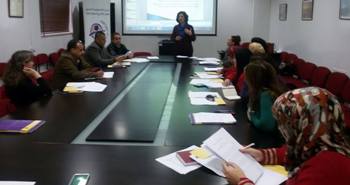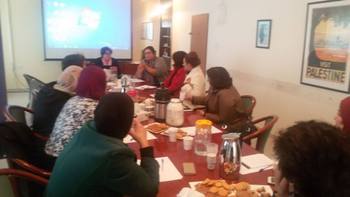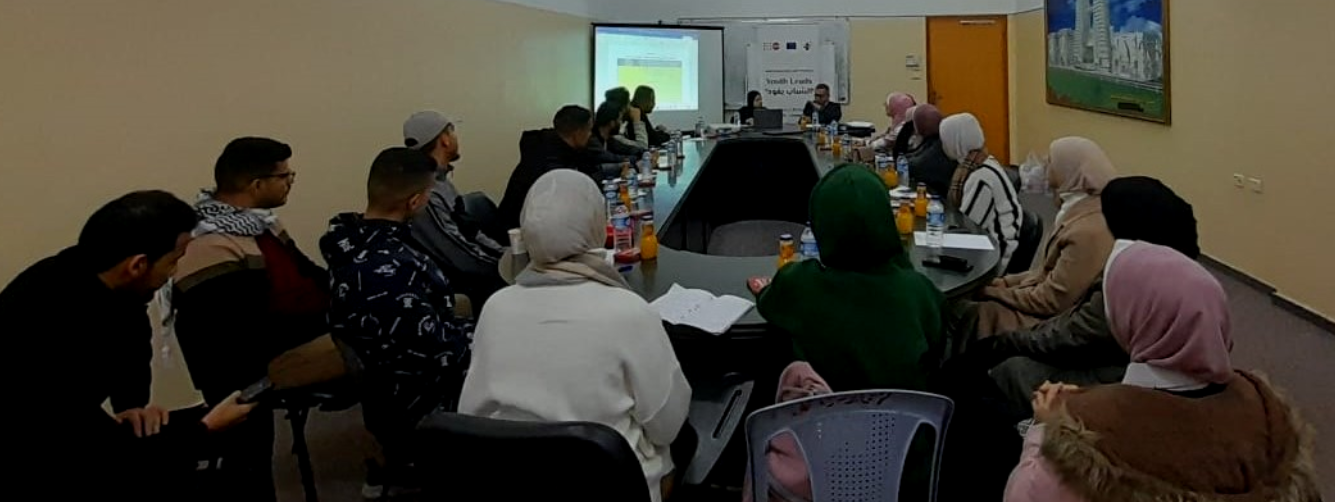
Ramallah – Two hearing sessions were recently held in Ramallah entitled: “Follow up on the applicability of the Takamul system in the health and social affairs sectors” as part of the “Supporting the Protection of Women” program carried out by MIFTAH in cooperation and coordination with UNFPA. Officials from these two sectors were present at the meetings in which the latest developments were presented pertaining to the applicability of Takamul. The participants listened to the most significant gaps and challenges obstructing the use of the system in these sectors before concluding with a group of recommendations.
Social affairs hearing
Participants in the social affairs session concluded with a number of recommendations that called for appointing contracted counselors who would be trained in offering services outside of official working hours. They also recommended that periodic meetings are held between directors and decision-makers and those working in the field so they could be part of the decision-making process; to circulate the latest developments in the protection system; to directly disseminate all information to all directorates and branches; to raise the level of coordination between the health, political and social sectors to provide methods of protection for women; to set a budget for activating and implementing the system within the ministry’s general budget to make the integration process easier; to review the memos of understanding signed by the social affairs ministry and the police on the one hand, and the ministry of social affairs and civil society organizations on the other, and to develop them in ways that coincide with new developments in the national system; to develop the database at the ministry whereby forms and surveys pertaining to documented cases are punched in; to support a meeting of the higher national committee to combat violence against women so as to integrate protection priorities into the agenda of the committee; to work towards passing the law of family protection from violence.
The UN representative at the session then presented on criminal justice and the role of the UN in the protection system. She spoke about working with service providers, the need to work with forensic medicine as one important and relevant party, and the importance of clarifying terms and distinguishing between violence against women and gender-based violence.
Basema Subuh from the Ministry of Social Affairs, stressed on the importance of involving field workers with the directors, citing the work of the ministry in protecting victims of gender-based violence. She said the ministry has a protection program for women, children and girls which it has been operating for many years. The social affairs ministry is the party directly responsible for building protection centers and for overseeing their internal procedures and regulations. She said the ministry has social workers and experts in the field of protection in all directorates.
Problems and challenges
This was followed by a presentation of the gaps and problems facing the social affairs ministry such as: no available guidance counselors to offer services to battered women; the huge gap between decision-makers in the various sectors and the people on the ground (service providers); the problem of disseminating agreed on information between the relevant parties; the lack of sufficient financial resources that would contribute to activating and institutionalizing the system; a lack of counselors that could provide services outside official working hours; the need to complete training for all service-providers on how to offer services to battered women; the lack of implementation of the database for monitoring and documenting cases of gender-based violence; a weakness in coordination between the social affairs ministry and the health and police sectors; the problem of coordination between the police and social affairs, especially when transferring battered women to protection centers; the lack of procedures that protect service providers for battered women; a lack of clarity in understanding the responsibilities and tasks between the police and social affairs sectors; a lack of resources for transferring battered women such as transfer vehicles; providing a budget for phones; the problem of sheltering women seeking services from the police sector; the pressure counselors face from police while trying to transfer cases to safe houses after the permissible period of time they are allowed to say in police stations has expired; the lack of understanding from these sectors of the social affairs ministry’s role in terms of the cases under its care. This has prompted the ministry to coordinate with the governor and some departments so that women could be sheltered for a specific period of time until another place is provided, thereby putting tremendous pressure on service-providers. It is also a repetition of the work provided by civil society organizations working towards enacting the national transfer system.
Health sector session
The participants in the hearing for the health ministry also concluded with several recommendations, including: demanding that the Ministry of Women’s Affairs should be responsible for training so as to prevent training repetition and duplicity; a call to all partners in the system to commit to attending the follow-up meetings; disseminating the Takamul system to all sectors; signing bilateral and trilateral memos of understanding between the various sectors; adopting the forms attached with the referral system and unifying all the forms; exempting battered women from medical report fees, which cost NIS150; considering the health ministry to be at the top of the hierarchy among the three sectors; to call on MIFTAH to continue follow up and coordination between the various parties.
The hearing also included the major gaps and challenges that hinder the use of the system in the health ministry, in addition to the media and its role; there was a call to build a media strategy for spreading awareness on the importance implementing the national system; making attempts to influence decision makers to integrate the system within strategies of social protection through media campaigns that shed light on the situation of battered women; they discussed mechanism for safe referral; organizing audio and visual media meetings and distributing posters and information pamphlets explaining the referral process for battered women; integrating the prosecution and the judicial system (forensic medicine) as active parties in the system for protection from violence; the need to actively coordinate between the ministry and the police family protection unit.
The obstacles facing the health ministry in implementing the system were also addressed, which included: the process of documenting cases is not conducted according to the national system but according to ministry procedures and forms; the absence of a system for following up cases that were referred from safe houses whereby the ministry’s services end with the completion of providing health services; the lack of special budgets in the health ministry for implementing the referral system; the opposition of some battered women to be referred to the family protection unit in the police.
At a later stage, based on the outcomes of the two sessions, MIFTAH will continue its efforts to activate and institutionalize the Takamul system in relevant ministries through presenting the policy papers from the hearing sessions to decision makers in these ministries.










